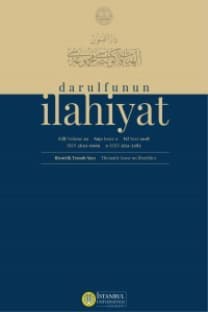JOACHIM WACH’IN RELIGIONSWISSENSCHAFT ÇERÇEVESİNDE İSLAM DİNİNE YAKLAŞIMI
Joachim Wach kendi Religionswissenschaft anlayışı kapsamında pek çok farklı dinî geleneğin yanı sıra İslamiyet’i de anlamaya çalışmıştır. Wach’ın kitaplarında ve yayımlanmamış ders notlarında İslam dininden bahsederken başlıca üç mevzu dikkat çekmektedir: Birincisi, Hıristiyan bir topluluğa İslam’ı anlatırken kullandığı dikotomi ve mukayeseler; ikincisi, Hz. Muhammed’i bir din kurucusu ve siyasi lider olarak tasvir edişi; üçüncüsü, İslam dini hakkında dayandığı kaynaklar. Wach’ın bu üç kalemde ortaya koyduğu yaklaşımlarından hareketle İslamiyet’i tanıtırken zamanının indirgemeci oryantalist anlayışını yansıttığı ortaya çıkmaktadır. Religionswissenschaft’ın içeriği ve metotlarının postmodern eleştiriye maruz kalıp yeniden yapılandırıldığı günümüzde Türk akademisinin hala Joachim Wach’ın tanım ve yönergesine bağlı kalması onun da köklü bir değişim zamanının geldiğini göstermektedir.
Anahtar Kelimeler:
Joachim Wach, Religionswissenschaft, oryantalizm, Joahim Wach yazmaları, dikotomi ve mukayese
-
Joahim Wach’s Approach to Islam within Religionswissenschaft Among various other religious traditions Joachim Wach sought to understand Islam within his own approach of Religionswissenschaft. There are three basic issues that attract attention when Joac-‐‑him Wach talks about Islam: First is the dichotomy and comparison he employs when he teaches Islam to a Christian audience. Second is his depiction of the Prophet Muhammad as the founder of a religion and as a political leader. Third is the sources Wach is dependent upon when he relates Islam. Based upon these three instances of Wach’s attitude, we may conclude that he reflects the contemporary reductionist and orientalist approach towards Islam. Recently, the nature and methods of Religionswis-‐‑senschaft has been subject to postmodern critique and it is being reconstructed accordingly. It is also vital for the Turkish academia, who still adheres to the definition and guidelines of Jocahim Wach, to reconsider its approach to Religionswissenschaft.
Keywords:
Joachim Wach, Religionswissenschaft, orientalism, Joahim Wach papers, dichotomy and comparison. ,
___
- Wach, Joachim. “Lecture Notes.” Box 6: Folders 9 & 10, Special Collecti-‐‑ ons Research Center at the University of Chicago Library http://www.lib.uchicago.edu/e/scrc/findingaids/view.php?eadid=ICU.SPCL.WA CH (son erişim 17.7.2014)
- . Introduction to the History of Religions, Macmillan, New York 1988.
- . “On Teaching History of Religions” Wach, Essays in the History of Religions (ed. Joseph M. Kitagawa) Macmillan, New York 1988, ss. 161-‐‑ 170.
- . Sociology of Religion, University of Chicago Press, Chicago 1944.
- . “Spiritual Teachings in Islam with Special Reference to al-‐‑ Hujwiri” Wach, Types of Religious Experience: Christian and Non-‐‑Christian, Uni-‐‑ versity of Chicago Press, Chicago 1951, ss. 80-‐‑104.
- . The Comparative Study of Religions, Columbia University Press, New York 1958.
- . “Universals in Religion” Wach, Types of Religious Experien-‐‑ ce: Christian and non-‐‑Christian, University of Chicago Press, Chicago 1951, ss. 30-‐‑48.
- Alles, Gregory. “After the Naming Explosion: Joachim Wach’s Unfinis-‐‑ hed Project” Hermeneutics, Politics and the History of Religions: The Contested Lega-‐‑ cies of Joachim Wach & Mircea Eliade (ed. C.K. Wedemeyer & W. Doniger) Oxford University Press, New York 2010, ss. 51-‐‑79.
- Carlyle, Thomas. On Heroes and Hero-‐‑Worship and the Heroic in History, H. Altemus, Philadelphia [1899?].
- Huff & Schluchter (ed.). Max Weber and Islam, Transaction Publishers, New Jersey 1999.
- Kızıl, Fatma. “Avrupamerkezciliğin Bir Yansıması Olarak Oryantalist Söylem: Kültürel Ödünç Alma Kavramı” İnsan & Toplum, Cilt:3, Sayı:6 (2013) ss. 323-‐‑332.
- Kitagawa, Joseph. “Life and Thought of Joachim Wach” The Comparative Study of Religions, Columbia University Press, New York 1958, ss. xiii-‐‑xlviii.
- Kurt, Abdurrahman. “Weber’in İslam Görüşü Üzerine Bir Değerlendir-‐‑ me” T.C. Uludağ Üniversitesi İlahiyat Fakültesi Dergisi, Cilt:19, Sayı:1 (2010), ss. 1-‐‑ 23.
- Martin, Alfred M. Seven Great Bibles the Sacred Scriptures of Hinduism, Buddhism, Zoroastrianism, Confucianism [Taoism], Mohammedanism, Judaism and
- Christianity, Frederick A. Stokes Company, New York [c1930]. Muir, William. The Life of Mahomet and history of Islam to the era of the Hegira: with introductory chapters on the original sources for the biography of Maho-‐‑ met and on the pre-‐‑Islamite history of Arabia, Smith-‐‑Elder, London 1858-‐‑1861.
- Nicholson, Reynold A. The Mystics of Islam, Schocken Books, New York 1975.
- Turner, Bryan S. Weber and Islam: A Critical Approach, Routledge & Kegan Paul Books, London-‐‑Boston 1974.
- Wolf-‐‑Gazo, Ernest. “Weber and Islam” ISIM Review Sayı:16 (Güz 2005), ss. 44-‐‑45.
- Zwemer, Samuel M. A Moslem Seeker After God: showing Islam at its best in the life and teaching of al-‐‑Ghazali, mystic and theologian of the eleventh century, Fle-‐‑ ming H. Revell Company, New York, Chicago [vd.] 1920.
- Yayın Aralığı: Yılda 2 Sayı
- Başlangıç: 1925
- Yayıncı: İstanbul Üniversitesi İlahiyat Fakültesi
Sayıdaki Diğer Makaleler
JOACHIM WACH’IN RELIGIONSWISSENSCHAFT ÇERÇEVESİNDE İSLAM DİNİNE YAKLAŞIMI
Valerie Gonzalez, Beauty and Islam, Aesthetics in Islamic Art and Architeture
BEŞİNCİ MANTIK ANABİLİM DALLARI KOORDİNASYON TOPLANTISI ÜZERİNE
HIRİSTİYAN VE İSLÂM DÜNYASINDAKİ PEYGAMBER TASVİRLERİ: BİR DEĞERLENDİRME
Uluslararası İmam Eş’arî ve Eş’arîlik Sempozyumu (Siirt Üniversitesi, Siirt, 21-23 Eylül 2014)
Patricia Crone, Ortaçağ İslam Dünyasında Siyasi Düşünce
MUSA CARULLAH BİGİYEF’İN KUR’AN YORUMLARINA DAİR ELEŞTİREL BİR TAHLİL
